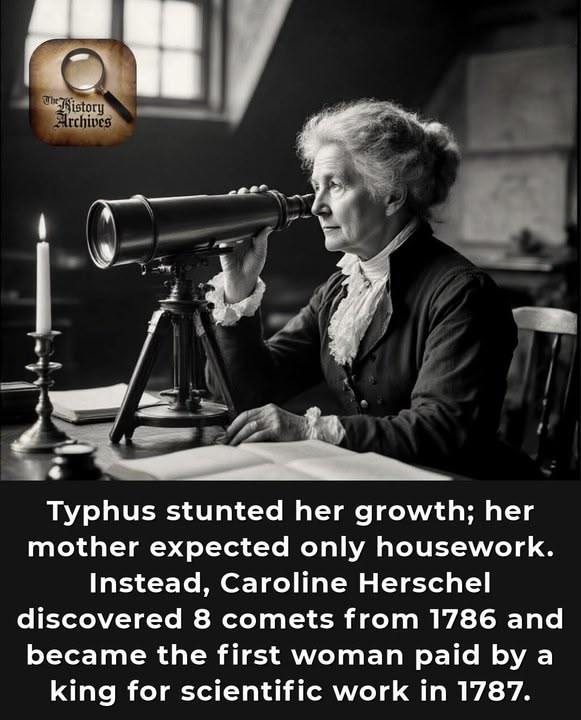First paid woman scientist
Denied formal education and facing a future of domestic toil after surviving typhus, Caroline Herschel turned her gaze to the stars in 1786, a path that led her to discover a comet and become the first woman recognized with a salary for scientific work.
Caroline Lucretia Herschel was born in Hanover, Germany, in 1750. In her era, opportunities for women, especially in scholarly fields, were severely limited.
A bout of typhus in her childhood stunted her growth. Her own mother reportedly believed Caroline's prospects were confined to household duties, not intellectual pursuits.
Her life took a different direction when she moved to England in 1772 to join her brother, William Herschel. Initially, she was to assist with his household and support his musical career, but she soon became deeply involved in his astronomical work.
Working diligently, often under challenging conditions, Caroline began to make her own significant observations. On August 1, 1786, she independently discovered her first comet. This was the first of eight comets she would identify between 1786 and 1797. 🔭
In recognition of her contributions, King George III granted Caroline an annual salary of £50 in 1787. This made her the first woman to receive official payment for scientific services, affording her a degree of financial independence virtually unheard of for women of her station at the time.
Caroline's work extended far beyond comet hunting. She meticulously catalogued hundreds of stars and nebulae, and made important corrections and additions to John Flamsteed’s *British Catalogue*. She is credited with the discovery of 14 new nebulae, including NGC 205, a companion galaxy to Andromeda. ✨
Her profound impact on astronomy did not go unrecognized by the scientific community. In 1828, she was awarded the Gold Medal of the Royal Astronomical Society, and in 1846, at the age of 96, she received the Gold Medal for Science from the King of Prussia.
Caroline Herschel passed away in 1848, but her legacy as a pioneering astronomer and a woman who broke barriers in science endures. Her meticulous observations and discoveries significantly advanced the understanding of the cosmos. 💫#WomenInScience #Astronomy #Trailblazer
Caroline Lucretia Herschel was born in Hanover, Germany, in 1750. In her era, opportunities for women, especially in scholarly fields, were severely limited.
A bout of typhus in her childhood stunted her growth. Her own mother reportedly believed Caroline's prospects were confined to household duties, not intellectual pursuits.
Her life took a different direction when she moved to England in 1772 to join her brother, William Herschel. Initially, she was to assist with his household and support his musical career, but she soon became deeply involved in his astronomical work.
Working diligently, often under challenging conditions, Caroline began to make her own significant observations. On August 1, 1786, she independently discovered her first comet. This was the first of eight comets she would identify between 1786 and 1797. 🔭
In recognition of her contributions, King George III granted Caroline an annual salary of £50 in 1787. This made her the first woman to receive official payment for scientific services, affording her a degree of financial independence virtually unheard of for women of her station at the time.
Caroline's work extended far beyond comet hunting. She meticulously catalogued hundreds of stars and nebulae, and made important corrections and additions to John Flamsteed’s *British Catalogue*. She is credited with the discovery of 14 new nebulae, including NGC 205, a companion galaxy to Andromeda. ✨
Her profound impact on astronomy did not go unrecognized by the scientific community. In 1828, she was awarded the Gold Medal of the Royal Astronomical Society, and in 1846, at the age of 96, she received the Gold Medal for Science from the King of Prussia.
Caroline Herschel passed away in 1848, but her legacy as a pioneering astronomer and a woman who broke barriers in science endures. Her meticulous observations and discoveries significantly advanced the understanding of the cosmos. 💫#WomenInScience #Astronomy #Trailblazer




